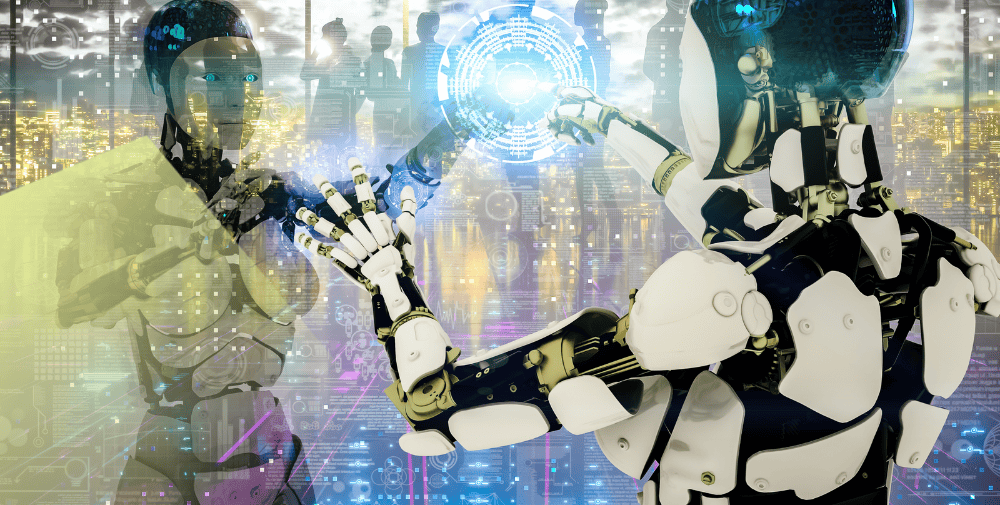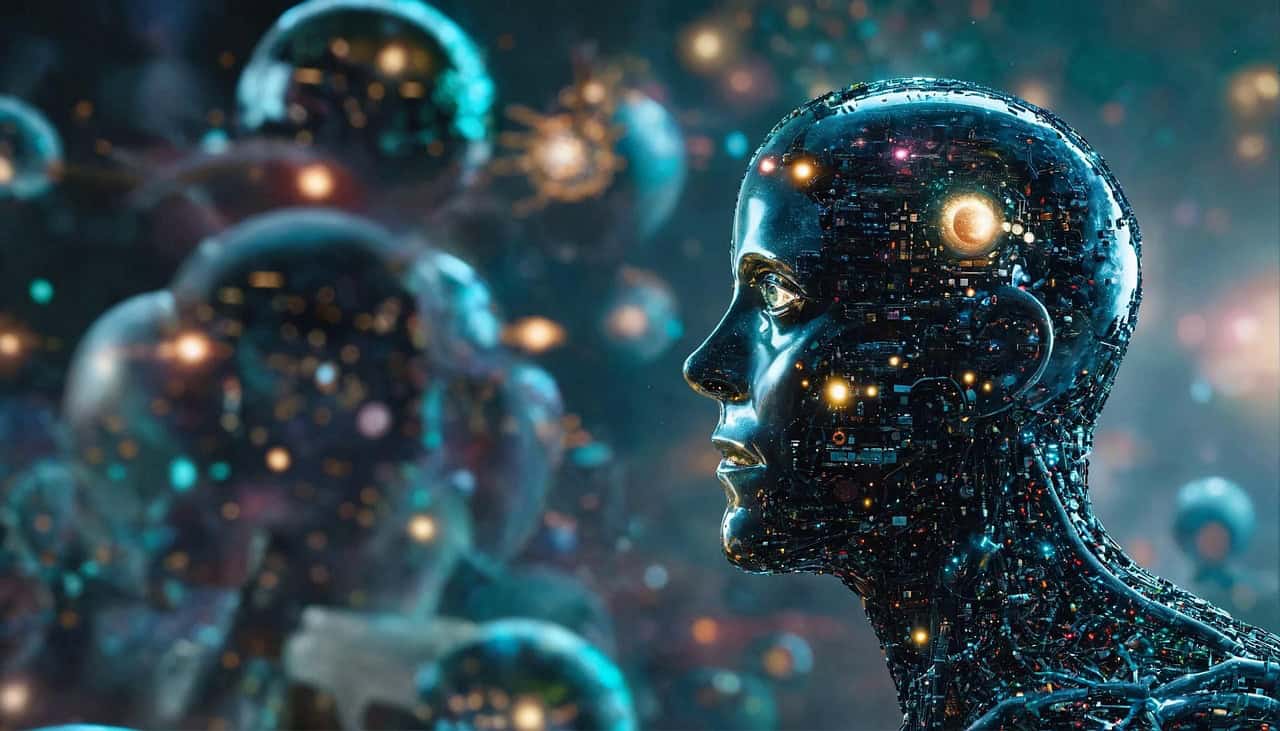Artificial intelligence (AI) is already rapidly changing the software industry: it is automating processes, optimizing workflows and enabling the development of new, innovative products. And according to many experts, the actual mass use of AI is yet to come. But what impact will this trend have on the software companies themselves? Which jobs will be made obsolete by AI and how will the job market in the industry change?
Two paths: automation of intellectual processes and new products
This change has long been underway on two paths in particular, according to Innovation Director Christoph Kögler from Infineon Dresden: on the one hand, companies are using AI to automate decision-making processes and to support creative activities that were previously carried out by humans with software systems. “The former has been around for some time, particularly in highly automated factories in the semiconductor, automotive and pharmaceutical industries, for example,” emphasizes Kögler. “An example of the latter is the relatively new generative AI such as ChatGPT, which can now also generate program code quite well. This makes software development faster and more productive.”
On the other hand, AI technology enables new products: “In the case of Infineon, for example, this includes hardware and software for autonomous driving functions in cars or solutions for the predictive maintenance of machines and systems for our industrial customers. AI represents new sales and growth potential here.”
Generative AI in particular has the potential to “revolutionize knowledge management in companies”, predicts SAP AI expert Henning Heitkötter. “By combining classic ML methods with the capabilities of generative AI, we are moving away from so-called weak AI, or ‘narrow AI’, which ultimately means that an AI model can be used for different areas of application rather than just one. AI will be a natural part of enterprise software in the future, just as cloud and mobile technologies have conquered the corporate world.”
And the players in the Free State want to be at the forefront of this. “For Saxony as a software-strong location, AI is a great opportunity,” says Managing Director Thomas Horn from the Saxony Economic Development Corporation. “Software companies in particular are already finding it easier to use this technology. This opens up new growth opportunities here.”
However, there are also risks alongside the opportunities: Companies and freelancers who don’t jump on the AI bandwagon soon could soon be completely left behind. “I’d venture a prediction: software companies that don’t use AI will no longer exist in two to five years,” says Head of Technology Frank Schönefeld from Telekom MMS in Dresden. “We are all under pressure to act and should use the time.”
These opportunities and risks have long been the focus of agile companies in particular. “Only AI does the pure copywriting for us,” says Ronny Siegel, for example, who runs “Conversion Junkies” in Dresden together with Marcus Franke. The pair’s Internet company boosts online retailers’ business on the Internet – and product descriptions, background texts and code optimization are equally in demand. The conversion junkies also rely on ChatGPT, Devin, Gemini & Co. for programming. “The AI can easily write scripts and help with plugin development,” says Ronny Siegel. “This speeds up processes, makes us more productive and allows us to deploy our people for the really important tasks.”
“Aleph Alpha” also expects significant upheavals: the latest AI generations are capable of completely reshaping knowledge work, according to the German AI flagship company. This requires “a human-machine model beyond chatbots”.
“AI is not causing Armageddon, nor is it a savior”
Daniel Abbou, Managing Director, KI-Bundesverband
The KI-Bundesverband takes a similar view. Daniel Abbou, Managing Director of the association, expects a “very big impact” in the next three to five years: “AI is neither causing Armageddon, nor is it a savior. It should be demystified and seen as a very useful tool,” he says. “Artificial intelligence will take over many routine tasks and thus change professions: from nurses, who no longer have to waste their shift times filling out Excel spreadsheets, to numerous repetitive processes in accounting, automated purchasing and tax consultancy.” And this applies even more and even earlier in software companies.
The changing labor market
All of this is changing both the job profiles and corporate culture in the software industry as well as the entire labor market. One might imagine this to be like the shifts of the 1970s and 1980s, which were triggered by the massive use of robots in industry and PCs in offices. Back then, too, there were fears that both would trigger mass unemployment. In practice, however, new job profiles, jobs and added value were created. “In practice, economies with a high robot density have particularly low unemployment – because they are more competitive,” emphasizes Prof. Frank Schönefeld. Something similar can also be expected from the latest AI wave: “AI will increase our competitiveness.” It is unlikely that entire professions will disappear: “It is more likely that people who work with AI will have an edge over people without AI.”
“I don’t believe that job profiles in the software industry will disappear completely in the short to medium term,” says Christoph Kögler from Infineon. “Even though there are now the first autonomous AI agents for software development, such as the ‘Devin’ program from US start-up Cognition Labs, not all software will be written automatically straight away. It is more likely that software developers will work much faster, with fewer errors and therefore much more productively than they do today. Mastering different programming languages will no longer be as relevant because code generation will increasingly be taken over by AI. Knowledge of the application domain, on the other hand, will become more important.”
Henning Heitkötter from SAP takes a similar view: “In our opinion, the use of generative AI and language models in particular will not lead to jobs being destroyed on a large scale,” he says. “Rather, there will be shifts and greater demand for workers in areas such as data analysis, AI development and research, AI training and optimization, AI ethics and AI project management.”
New job profiles and differentiated requirements
“The demand for AI experts is already increasing significantly,” reports Daniel Abbou from the German AI Association. “This is primarily aimed at application experts, but also at AI programmers.” Prompt experts, for example, are currently in particularly high demand: specialists with very different professional backgrounds, even outside of computer science, but who have mastered the art of using ChatGPT, Dalle-E, Gemini, Sora, Luminous & Co. the desired codes, essays, images or videos instead of confused artifacts.
These professions are gaining in importance due to the AI trend:
- AI developers and researchers who work on the development of new AI technologies and applications.
- Data scientists and analysts who process and analyze large amounts of data to gain insights for improving business processes.
- AI trainers who train and optimize AI systems to achieve better results.
- AI ethicists who deal with the ethical implications of using AI and develop guidelines for the responsible use of AI.
- AI project managers who plan, coordinate and implement AI projects.
- Software developers with special knowledge of how generative AI can be used in software applications (e.g. with knowledge of “prompt engineering”).
Accumulate expertise yourself or buy it in?
But without the bulging war chests of large corporations, where are small and medium-sized companies supposed to get the experts they need to use AI? And in a technology sector with short innovation cycles that changes every month? “Knowledge that you buy in from the labor market via external people is already outdated the moment you hire them anyway,” says Ronny Siegel from “Conversion Junkies”. “That’s why we build up our AI experts ourselves: through lots of further training. We encourage everyone to constantly develop their AI skills.” This is already leading to a change in working culture, particularly for specialists, which could well lead to hybrid human-AI collectives: “I think developers will soon become supervisors, each of whom will be in charge of four to five AIs.” Siegel’s advice: “Every company should actively address this challenge immediately. It took us about six months to bring our employees up to the current level of AI use – and every month counts.”
AI transformation at a glance
- Increasing efficiency through automation: The strengths of AIs lie primarily in repetitive tasks: Routine tasks can be automated comparatively easily using ChatGPT, Gemini & Co. This includes testing code, troubleshooting and creating documentation. This relieves the burden on professional software developers, who can then concentrate on creative core tasks. This change ultimately increases productivity in software companies.
- New products: AI can support the development of new, intelligent software solutions, for example in self-driving cars, through intelligent voice assistants or AI-supported diagnostic tools in medicine. These new products and services open up new markets and business models for software companies.
- Change in the labor market: The use of AI will inevitably lead to a change in the job landscape in the software industry. Jobs that are limited to repetitive tasks will be automated by AI and become obsolete. In future, software developers with new skills will be in demand. Among other things, they will need to understand how AI works and be able to integrate AI technologies into their work. Problem-solving skills and a willingness to collaborate will also be in greater demand on the job market than ever before.
- Continuing education and retraining: In order to meet the demands of the job market of the future, software developers will need to continuously train and retrain. Further training in the knowledge sectors of AI, data science and soft skills is becoming increasingly important.
_ _ _ _ _ _
Author
Heiko Weckbrodt
hweckbrodt@gmail.com
_ _ _ _ _ _ _
This article was written exclusively for NEXT “In Focus: Software”.
👉 To the complete issue of the magazine



